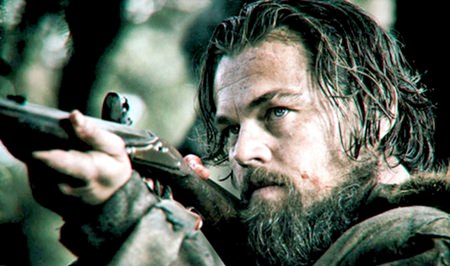Los Angeles (AP) – After confining himself largely to the interior of a Broadway theater — and the psyche of Michael Keaton’s Riggan Thomson — in the best picture-winning “Birdman,” Alejandro Gonzalez Inarritu and his maverick cinematographer, Emmanuel Lubezki, have opted for the open air of the West, circa 1823, for “The Revenant”, a loose adaptation of Michael Punke’s 2002 novel about the frontiersman Hugh Glass (Leonardo DiCaprio).
The result is some of the most ravishing filmmaking of the year, or any year, as Inarritu and Lubezki stretch their fluid long takes down river rapids and into the kind of clashes — a mauling grizzly, an ambushing tribe — not rendered before with this kind of awe-inspiring, naturally lit virtuosity. But awe is the only thing “The Revenant” is well stocked in, if you don’t count snow and beards.
 This photo shows Leonardo DiCaprio in a scene from the film, “The Revenant.” (Photo/Twentieth Century Fox)
This photo shows Leonardo DiCaprio in a scene from the film, “The Revenant.” (Photo/Twentieth Century Fox)
“The Revenant” isn’t just showy about its audacity, it’s relentlessly chest-thumping. DiCaprio isn’t the film’s true star; it’s Inarritu’s camera. He never lets us forget it, not just in staggering one-takes but by allowing characters to look into the lens, sometimes even fogging it with their breath. “The Revenant” earns your admiration, only to lose it by continually insisting upon it.
Somewhere in the realm of the Dakotas and Montana is the Rocky Mountain Fur Co., guided by Glass in their pursuit through hostile and uncompromising territory for beaver pelts. In our first view of the trappers, they’re camped in river-side pines when an eerie suspense settles over them. Arrows from all around sail into them before Ree tribesmen, searching for a stolen daughter, stream into the camp.
With mayhem and savagery all around, Inarritu’s balletic camera sweeps through the slaughter and eventually drifts down the river with a small band of survivors. Among them are Glass, his Pawnee son (Forrest Goodluck), the company’s leader, Andrew Henry (Domhnall Gleeson), a callow youngster (Will Poulter) and John Fitzgerald (Tom Hardy).
The scene is the first taste of what “The Revenant” has in store: the throbbing intensity of survival, played out across harsh, wintery terrain, in a series of flights and pursuits between men, native and not, seeking a variety of vengeances.
DiCaprio produces an often wordless, exceptionally committed performance of Glass’ great determination. But no one is more in rhapsody over the manliness of the mission than Inarritu. His bleak and beautiful movie is overwrought, but it’s also soaked through with the brutality of the frontier and the tragedy of its indigenous people. Native Americans traverse “The Revenant,” carrying the deepest horrors of the land. It’s something to contemplate, when not ooo-ing at the spectacular set pieces.
“The Revenant,” a 20th Century Fox release, is rated R by the Motion Picture Association of America for “strong frontier combat and violence including gory images, a sexual assault, language and brief nudity.” Running time: 156 minutes. Three stars out of four.




